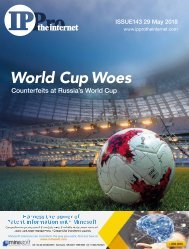IPPro Patents Issue 049
In this issue: Andrei Iancu confirmed as USPTO director
In this issue: Andrei Iancu confirmed as USPTO director
Create successful ePaper yourself
Turn your PDF publications into a flip-book with our unique Google optimized e-Paper software.
Pacific Partnership<br />
Trump’s actions benefited the<br />
developing countries that are members of<br />
the TPP, because there will no longer be a<br />
conflict between the national legislation<br />
and the CPTPP, reaching an equilibrium<br />
point in this topic<br />
Maylee Savournin, lawyer, OMC Abogados<br />
Taking in consideration Trump´s “Make America Great Again” slogan,<br />
and the withdrawal of the US from this treaty, we can say that the<br />
IP chapter of the original TPP has not been severely affected by the<br />
renegotiation, because the US is a great innovative and technological<br />
power in the world, and it is natural that it seeks to protect to the<br />
maximum its investment in research and production of new products,<br />
so when they negotiate bilateral or multilateral trade agreements, it is<br />
not surprising that its content resembles its legislation.<br />
Trump’s actions benefited the developing countries that are members<br />
of the TPP, because there will no longer be a conflict between the<br />
national legislation and the CPTPP, reaching an equilibrium point in<br />
this topic.<br />
Are there any potential gains to be had for Peru in the renegotiation<br />
of the TPP? Are there any concerns that Peruvian IP professionals<br />
have about the original agreement that could be addressed?<br />
Yes, there are. As we said before, the objective of the CPTPP,<br />
was not to modify the original text, but to obtain an equilibrium<br />
point after the withdrawal of US. Therefore, Peru has obtained the<br />
following benefits:<br />
Winning five new markets in a single trade agreement, as is the<br />
case of Australia, Brunei Darussalam, New Zealand, Malaysia and<br />
Vietnam. The potential increase of Peruvian non-traditional exports<br />
is estimated to these markets in $2,250 million with the entry into<br />
force of the TPP. The country also wins by the improvement in access<br />
conditions and rules agreed in previous bilateral agreements.<br />
Access to global value chains, as a result of the application of<br />
the mechanism known as “accumulation of origin”, which allows<br />
to consider consumable goods, materials or intermediate goods<br />
originating in any country as if they were Peruvian. This mechanism<br />
will particularly benefit small companies, since they will be able to<br />
export inputs that are linked to a value chain in the TPP block.<br />
The integral nature and high standards of the TPP will contribute<br />
to the process of modernisation of state institutions, as well as the<br />
application of expeditious systems and procedures of institutions<br />
linked to foreign trade. At the same time, it will allow Peru to benefit<br />
from the good management practices of its partners in the treaty. And<br />
the most important gain for Peru is that the CPTPP members have<br />
recognised the existing link between traditional knowledge, genetic<br />
resources and IP, topics that come together in a way that contributes<br />
to their protection and adequate utilisation by society.<br />
Peruvian IP professionals have one main concern about the TPP,<br />
which is the acceptance of the protocol relating to the Madrid<br />
Agreement concerning the international registration of trademarks,<br />
approval has always been objected by different sectors involved<br />
using constitutional, legal and administrative reasons and also<br />
because of the negative impact on the resources generated by the<br />
competent national office. <strong>IPPro</strong><br />
Peruvian IP professionals have one<br />
main concern about the TPP, which is<br />
the acceptance of the protocol relating<br />
to the Madrid Agreement concerning the<br />
international registration of trademarks<br />
Oscar Mago, managing partner, OMC Abogados<br />
19 <strong>IPPro</strong> <strong>Patents</strong>







